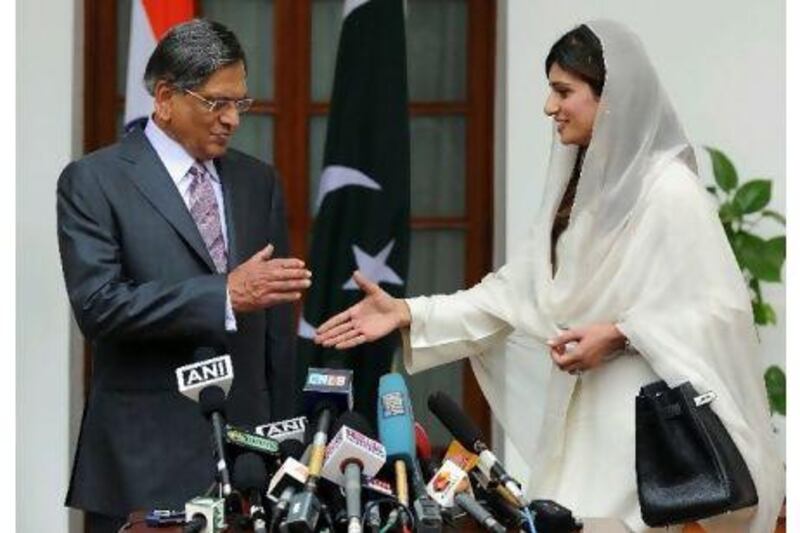NEW DELHI // India and Pakistan agreed to expand trade and travel across their border in divided Kashmir and step up counter-terrorism cooperation, saying the moves illustrated a new era in bilateral ties.
The countries will double the number of days goods can be traded across their border in the Himalayan region to four a week, increase the frequency of bus services and ease restrictions on travel permits, they said yesterday in a joint statement issued after their foreign ministers met in New Delhi.
Hina Rabbani Khar, 33, Pakistan's first woman foreign minister and the youngest holder of the post, standing alongside her Indian counterpart, SM Krishna after talks, said: "It is the desire of both countries to make it an uninterrupted and uninterruptable process." A changed "mindset" will take the process forward, she said.
Kashmir, claimed in full by both India and Pakistan since their independence from British rule in 1947 and the cause of two of their three wars, remains the biggest hurdle to improved cross-border relations. The Indian foreign secretary, Nirupama Rao, said officials had "expressed our concerns" over Ms Khar's meeting Tuesday with leaders of separatist groups opposed to Indian rule in Kashmir.
India and Pakistan are "moving in the right direction" and steps like those announced to bring people together in Kashmir can go a long way to resolving issues, said Ashok K Behuria, an analyst at the New Delhi-based Institute for Defence Studies and Analyses.
Improved relations between India and Pakistan are crucial for stability in South Asia and for US hopes of resolving the decade-old war in Afghanistan, the US State Department has said. That importance increased as the US president, Barack Obama, ordered the first withdrawals of American troops that will lead to an end of the US combat role in Afghanistan by 2014.
Spikes in tension between Pakistan and India risk prompting Pakistan's armed forces to shift troops from the fight against Taliban and allied militants in that country to reinforce the border with India, say analysts such as Imtiaz Gul, chairman of the Islamabad-based Centre for Research and Security Studies.
While being fully aware of the "challenges that lie ahead" Mr Krishna said relations were on the right track. Discussions on Jammu and Kashmir will attempt to find a "peaceful solution by narrowing divergences and building convergences," he said.
Yesterday's talks were the first between the foreign ministers of the two countries in a year. The previous meeting in July 2010 exposed deep differences on how to rebuild a peace process shattered by the 2008 attack on Mumbai by Pakistani gunmen.
While 20 people died in blasts in the same city July 12, the government in New Delhi has not publicly linked militants in Pakistan to the bombings.
The US secretary of state, Hillary Clinton, speaking in Delhi last week, said the US was encouraged by the dialogue as India and Pakistan bid to build "confidence between them."
Peace talks restarted in February with India maintaining it will continue to insist that Pakistan take action to dismantle militant groups based on its soil and targeting India. An outfit calling itself Indian Mujahideen has claimed responsibility for bombings in Indian cities since 2008.





